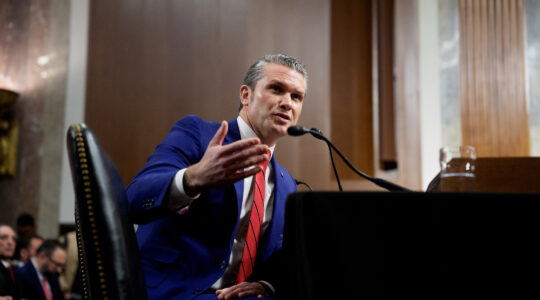NEW YORK (JTA) — If Glenn Beck has his way, many American Jews would be abandoning their synagogues. If one Jewish group has its way, the popular right-wing talk-show host will be drowned out by a wave of haikus.
Beck, who has called the health care reform legislation “an assault on the republic” and the first African-American president a “racist,” is urging congregants to quit their churches if the term “social justice” appears anywhere on their Web sites.
“I beg you, look for the words ‘social justice’ or ‘economic justice’ on your church Web site,” Beck said on his nationally broadcast radio program March 2. “If you find it, run as fast as you can. Social justice and economic justice, they are code words.”
To illustrate the point further, Beck on his television show held up cards imprinted with a swastika and the hammer and sickle. Social justice, Beck said, was tantamount to Nazism and communism.
Christian leaders of various stripes were outraged, but Jewish groups have had little to say — surprising, perhaps, considering that a good number of synagogues in the United States would be shuttered if American Jews followed Beck’s advice.
The exception was Jewish Funds for Justice, which last week launched the Web site “Haik U Glenn Beck,” in which users are invited to respond to Beck — poetically.
“Hurling expensive/coffee at the expensive/TV screen now, Ahhh,” wrote the novelist and Daily Beast columnist Christopher Buckley in one of nearly 1,000 haikus submitted during the site’s first week of operation.
The Beck controversy comes at a moment when social justice, for years a growing — and minimally controversial — area of communal activity, has emerged as something of a dividing line between Jewish liberals and conservatives.
Jack Wertheimer, a professor and former provost of the Jewish Theological Seminary of America, sparked a minor uproar last month with his criticism in the March issue of Commentary magazine that community resources were being diverted to projects aimed at helping non-Jews under the guise of social justice.
More recently, Jennifer Rubin, also writing in Commentary, called President Obama’s Passover message, with its emphasis on a universal social message, “off-key, hyper-political, and condescending.” Obama’s “secularized spiel,” Rubin wrote, denies the holiday’s uniquely Jewish message.
At the same time, liberal Jewish bloggers sided with the president, arguing that the retelling of the Exodus story is meant to inspire Jews and others to combat injustice.
Such talk, but especially Beck’s comments, are a sign of desperation, said Mik Moore, the chief strategy officer at Jewish Funds for Justice.
“It’s part of a broader assault, in this instance, on faith communities that put social justice at the center of their work,” Moore said. “It stems from a fear that the side that rejects the relationship between Judaism and social justice, that they’re losing.”
It’s noteworthy that the tension between Jewish particularism and wider social concerns should come to a head around Passover, perhaps the most expansively understood and universally resonant of Jewish holidays. Passover seders have long been an occasion for interfaith dialogue, and Jewish groups routinely organize seders around such diverse themes as labor rights, children’s nutrition and the civil rights struggle.
Jewish conservatives, for their part, don’t call for Jews to abandon wide social causes altogether, but rather to find a better balance between them and the specific needs of the Jewish community.
“Nobody here is claiming that we need to expunge a universalist frame of reference from our Jewish point of view,” said Jonathan Tobin, the executive editor of Commentary, who asserted that putting Beck and Wertheimer in the same category is “screwy.”
“What we’re saying is, when things get out of whack, when you are primarily interested in the universal agenda, then the Jewish end of it can suffer,” he said.
Newer Jewish non-profits often claim that social justice is a greater animating cause for younger Jews than the issues traditionally associated with older, more established Jewish organizations. But Tobin believes that if Jewish affiliation and donations to specifically Jewish causes continue to decline, then all Jewish institutions will suffer — the social justice groups included.
“The idea that only Jewish universalism will survive while Jewish parochialism goes down the tubes is, to me, a remarkably foolish point of view,” Tobin said.
For his part, Moore accepts that. Jewish Funds for Justice, he said, wouldn’t be training rabbis and working with synagogues if it was unconcerned with strengthening the Jewish community.
“But,” he added, “we’re doing it in a way that is meaningful to them and yet is genuinely rooted in Jewish history and tradition.”
JTA has documented Jewish history in real-time for over a century. Keep our journalism strong by joining us in supporting independent, award-winning reporting.





